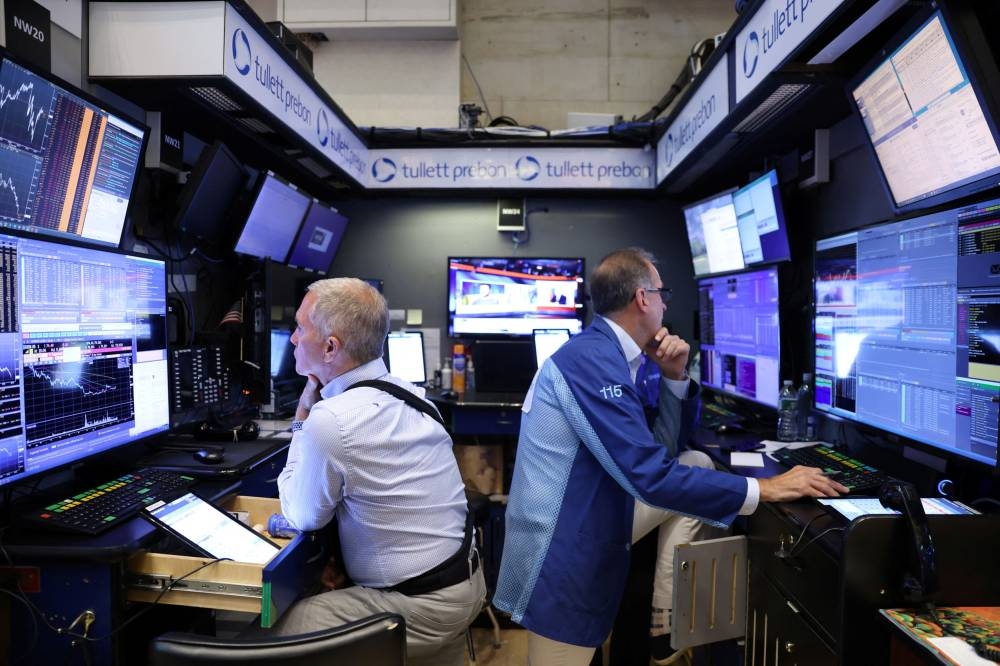NEW YORK, Oct 11 — The MSCI global index of stocks lost ground in a volatile session yesterday while the dollar gained slightly as investors braced for high inflation data and the start of corporate earnings season.
Oil futures sold off and Wall Street’s stock indexes were volatile, while US bond markets were closed for a federal holiday.
Weighing on investors was also a Russian missile attack on Ukraine that killed civilians and knocked out power and heat in cites across the country. President Vladimir Putin said he had ordered “massive” long range strikes after an attack on the bridge linking Russia to the annexed Crimean peninsula over the weekend, and threatened more strikes in future if Ukraine hits Russian territory.
US investors, anxious about rising interest rates and signs of economic weakness, were also cautious ahead of inflation data due out Thursday and the start of the third-quarter earnings season on Friday.
JPMorgan Chase & Co Chief Executive Jamie Dimon told CNBC the United States and the global economy could tip into a recession by mid-2023.
Then Fed Vice Chair Lael Brainard said tighter US monetary policy had begun to be felt in an economy that may be slowing faster than expected, but that the full interest rate increases would not be apparent for months.
“There’s nothing specific in Brainard’s comments that makes you say the Fed is changing its policy but there’s at least some signs that the Fed is not proceeding blindly on a rate hiking restrictive path,” said Steve Sosnick, chief strategist at Interactive Brokers in Greenwich, Connecticut.
“Dimon’s comments definitely didn’t help. A lackluster downward market didn’t need those comments. They’ve been balanced out somewhat by Brainard.”
The Dow Jones Industrial Average fell 93.91 points, or 0.32 per cent, to 29,202.88; the S&P 500 lost 27.27 points, or 0.75 per cent, at 3,612.39; and the Nasdaq Composite dropped 110.30 points, or 1.04 per cent, to 10,542.10.
Nasdaq led the declines and registered its lowest closing level since July 2020 as chip stocks sold off sharply on the Biden administration’s sweeping set of export controls published on Friday, including a measure to cut off China from certain semiconductors made with US equipment.
Wall Street had already declined on Friday after an upbeat September jobs report cemented expectations for another large rate hike.
Four of the biggest US banks are due to report earnings on Friday, with large lenders expected to post lower profits as the economy slowed and volatile markets stifled dealmaking.
The MSCI All-World index ended down 1.0 per cent in its fourth straight day of losses. The pan-European STOXX 600 had closed down 0.4 per cent after skimming one-week lows. Emerging market stocks 1.4 per cent.
Chicago Fed President Charles Evans also said yesterday that US Fed officials were closely aligned on the need to raise the target policy rate to around 4.5 per cent by early next year, unless data upends current projections.
Minutes of the Fed’s last policy meeting will be published this week and could offer clues on rate-setters’ thinking about future monetary policy.
The dollar index, which measures the greenback against a basket of currencies, rose 0.3 per cent while the euro was down 0.37 per cent at US$0.9705 (RM4.51).
The Japanese yen weakened 0.25 per cent versus the greenback at 145.70 per dollar, while sterling traded at US$1.1057, down 0.24 per cent on the day.
The Bank of England sought to ease concerns about this week’s expiry of its programme designed to calm turmoil in the government bond market, announcing new safety-net measures including a doubling of the maximum size of its debt buybacks.
Even though US bond markets were closed yesterday, Matthew Miskin, co-chief investment strategist of John Hancock investment management based in Boston, said the UK news was not helping the US stock market.
“It looks like an ongoing spillover from the bond market into the equity market continues this week,” said Miskin, adding to expectations for a high inflation reading later this week.
Investors are betting “the Fed’s not going to be able to back down until inflation comes down,” he said.
Oil prices sank by nearly 2 per cent, after five straight sessions of gains, as investors feared economic storm clouds could foreshadow a global recession and erode fuel demand.
US crude fell US$1.51 to US$91.13 per barrel while Brent settled at US$96.19, down US$1.73.
Gold prices fell as an elevated dollar and solidifying bets for an aggressive Fed interest rate hike pushed the non-yielding bullion to its lowest level in a week.
Spot gold dropped 1.5 per cent to US$1,669.28 an ounce. US gold futures fell 1.89 per cent to US$1,668.40 an ounce. — Reuters






















